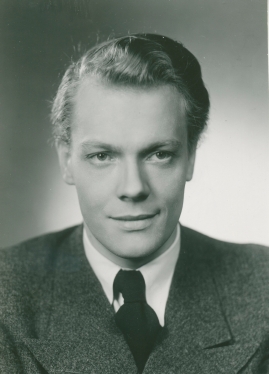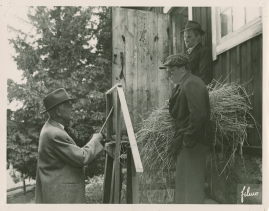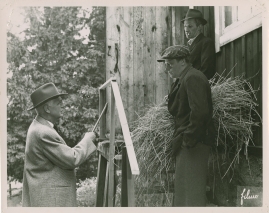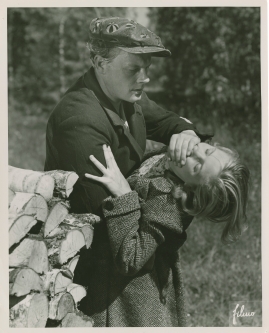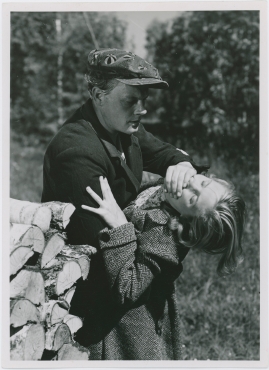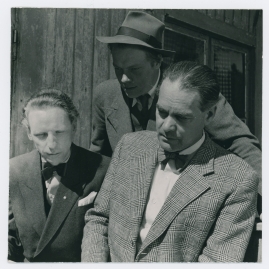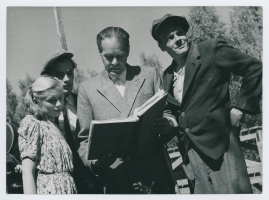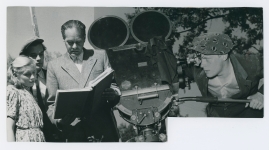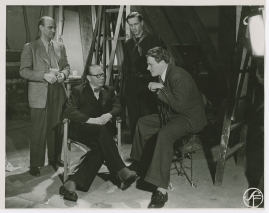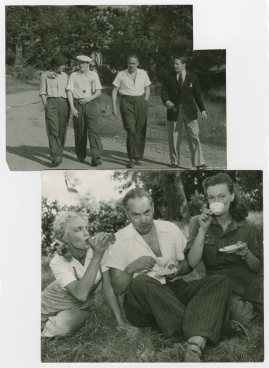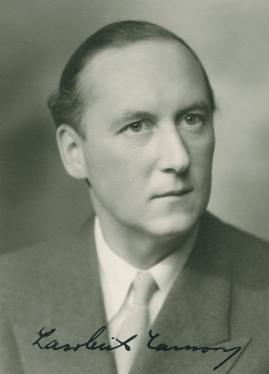Erik "Hampe" Faustman
Table of contents
- Basic facts
- Links and resources
- Biography
- Awards
- Films
- Original work
- Soundtrack listing
- Groups
Basic facts
Media (10)
| Alternative names |
|
|---|---|
| Cast |
|
| Director |
|
| Show all films |
Biography
Swedish director and actor. Born as Erik Stellan Chatham in Stockholm. Died in Stockholm.-Erik "Hampe" Faustman was the most overtly political director of the generation that emerged during the 1940s. This is especially true of the films he made towards the end of that decade: När ängarna blommar ('When the Meadows are in Bloom', 1946), Harald Handfaste (1946), Lars Hård (1948), Strange Harbor (Främmande hamn, 1948) and Vagabond Blacksmiths (Smeder på luffen, 1949).He started out as an actor,...
Biography
Swedish director and actor. Born as Erik Stellan Chatham in Stockholm. Died in Stockholm.
-
Erik "Hampe" Faustman was the most overtly political director of the generation that emerged during the 1940s. This is especially true of the films he made towards the end of that decade: När ängarna blommar ('When the Meadows are in Bloom', 1946), Harald Handfaste (1946), Lars Hård (1948), Strange Harbor (Främmande hamn, 1948) and Vagabond Blacksmiths (Smeder på luffen, 1949).
He started out as an actor, something he practised sporadically until the end of his career, but by the age of 25 he had directed his second feature film, Sonja (1943). Its theme of forgiveness and reconciliation is one that he was to explore in a number of films, most dramatically in The Girl and the Devil (Flickan och djävulen, 1944), a reworking of the old myth of the Devil inhabiting the body of a young woman, Maria. Farmer's son Olof, however, loves her with strength and devotion, breaking down the Devil's power and allowing her to make peace with herself.
Two further films set in the environment of tied agricultural labour are based on novels by Jan Fridegård, När ängarna blommar and Lars Hård, also explore a penitence and reconciliation theme. När ängarna blommar is about a strike on a large estate. Strike-breakers are called in, one of whom is killed in a fight by the film's main character, Gunnar. Remorse for his crime prompts Gunnar himself to become a strike-breaker. He shoulders the burden of his guilt in the hope of attaining inner peace, but when it is revealed it serves as his deliverance. With his head bowed he sets off to receive both his punishment and absolution.
Linked in certain ways to När ängarna blommar, Lars Hård begins in Stockholm's Långholmen prison, its story unfolding in one long recollection. To reveal too much of the plot would be to undermine the impact of the ending. One of the prison guards has restored Lars Hård's self-belief: he breaks away from his friends at the prison and returns home. His crime resulted in his sentence, yet correctly assimilated it leads to an eventual reconciliation with himself.
Overt political messages are not dominant in Faustman's work, yet he always evokes the powers of goodness within human beings, often in a political guise. Such is the case with his matinée film Harald Handfaste, a costume drama set in the 14th century starring George Fant as the leader of a group of highwaymen fighting against a German occupying force.
Faustman's best-known film is Strange Harbor, reportedly booed as "communist propaganda" when it screened at Cannes in 1949. Based on a play by Josef Kjellgren, the action is set in Gdansk in 1938. The crew of a Swedish ship, on discovering that their cargo comprises weapons destined for the Nationalist side in the Spanish Civil War, decide to mutiny. One of the crew is shot and killed. One of the most famous scenes is of the remainder of the crew spontaneously breaking into song with "The Internationale" at the grave of their comrade.
The somewhat recherché Vagabond Blacksmiths is a kind of socialist "Vägen till Klockrike" (a Harry Martinson novel published as "The Road" in English): two blacksmiths and one, to begin with at least, teetotal evangelical Christian travel around the country at the start of the 20th century in search of work. Chaotic in nature, the film is a mixture of rural populism, romance and social pathos. A dream sequence transports the action to contemporary Sweden, with capitalism portrayed as the major threat to world peace.
Erik "Hampe" Faustman was a director of uneven quality, yet many of his films have nonetheless stood the test of time.
Gunder Andersson (2011)
(translated by Derek Jones)
